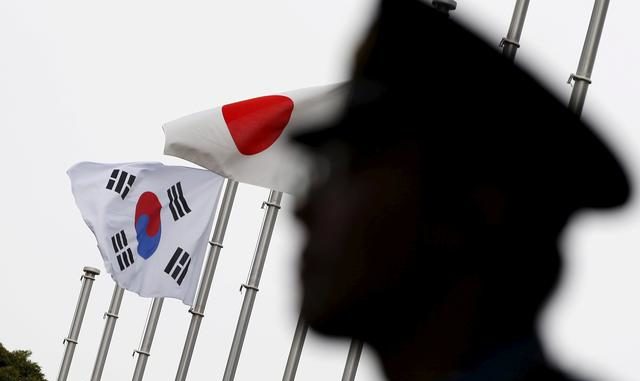
A letter threatening to hunt Koreans and containing what appeared to be a bullet has been sent to the South Korean embassy in Japan amid worsening ties between the Asian neighbors, Japanese media said on Tuesday.FILE PHOTO: A police officer stands guard near Japan and South Korea national flags at hotel, where South Korean embassy in Japan is holding the reception to mark the 50th anniversary of normalisation of ties between Seoul and Tokyo, in Tokyo June 22, 2015. REUTERS/Toru Hanai/File Photo
Relations between the two countries have been overshadowed by Japan’s 1910-1945 colonization of the Korean peninsula, and recently a dispute over Korean forced laborers spilled into trade and then into security when South Korea scrapped an intelligence sharing pact last month.
“I’ve got a rifle and I’m hunting Koreans,” said the letter that was delivered to the South Korean embassy in Tokyo last week, the Kyodo news agency reported.
It contained what appeared to be bullet, the news agency said, adding that police were investigating.
Police declined to comment.
A member of staff at the embassy confirmed that the letter had been delivered but declined to give any details.
The tension between the two countries has spilled over into travel and culture, with a Japanese airline announcing last week it would halt some flights to South Korea.
A Japanese art exhibition has withdrawn a statue by Korean artists representing Korean women forced to serve in Japan’s military brothels during World War Two, sparking debate about censorship.
Publishers of Japan’s weekly Shukan Post tabloid apologized on Monday after their Sept. 13 edition, which carried a special report titled “We Don’t Need Korea,” sparked widespread outrage and accusations of hate speech.
“This report will spread misunderstanding and was lacking in consideration,” the magazine’s editors said in a statement.
Though many Twitter users denounced the magazine with comments such as “We Don’t Need Shukan Post”, others defended it, saying Koreans and their supporters were being too sensitive.
Reporting by Elaine Lies and Linda Sieg; Editing by Robert Birsel
TOKYO (Reuters) –
